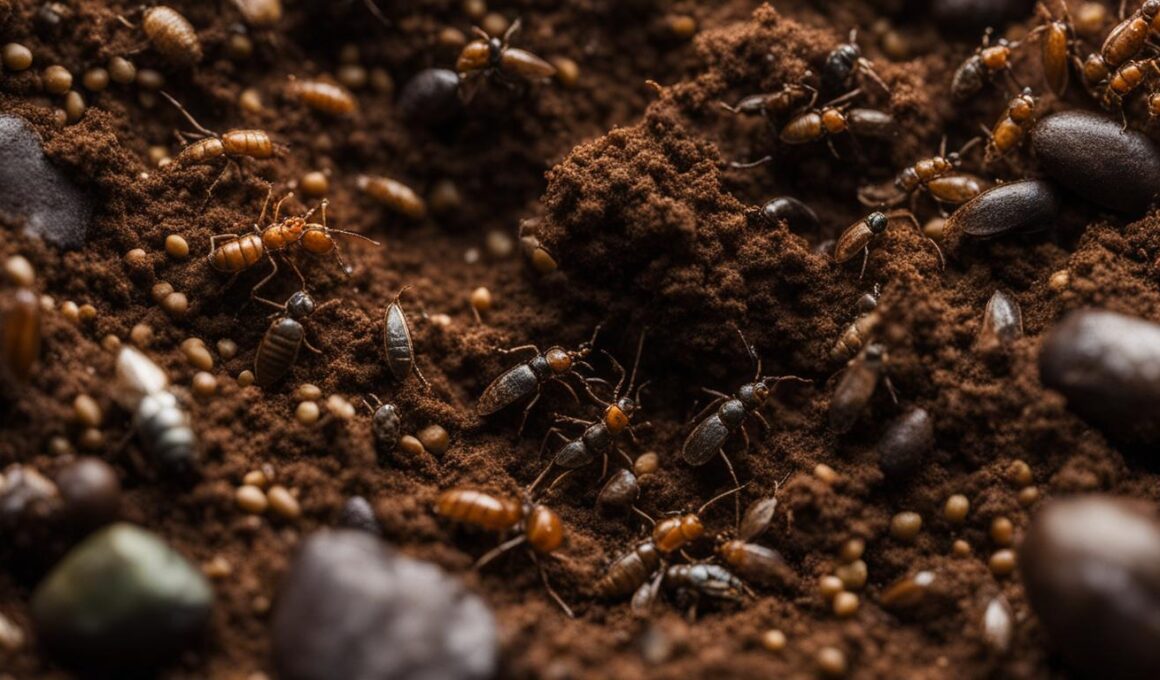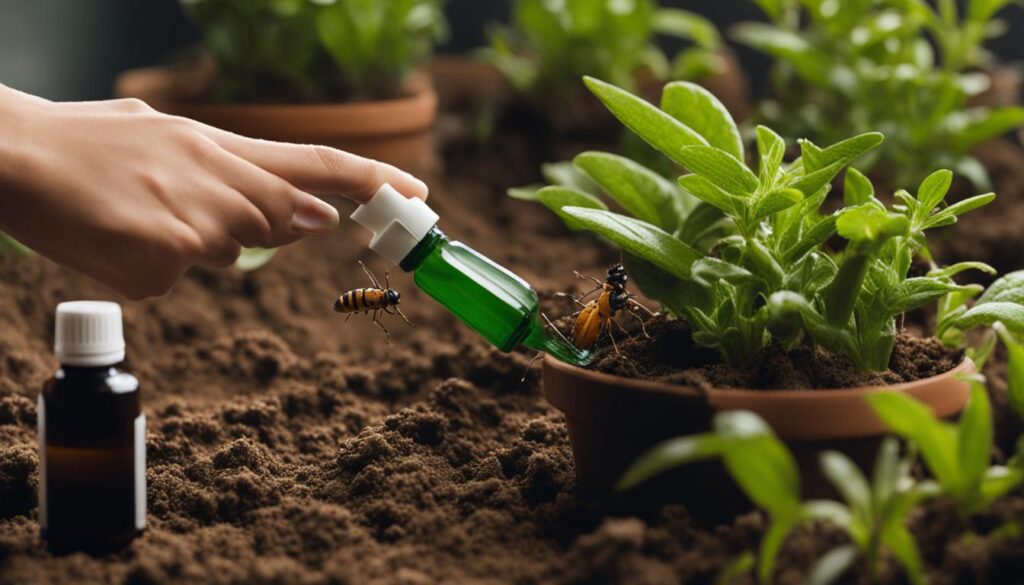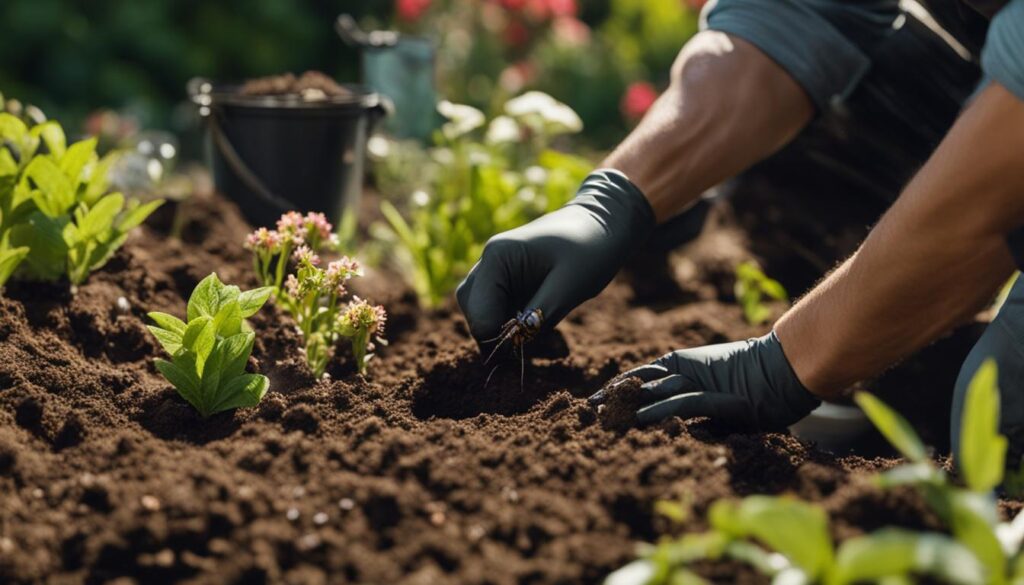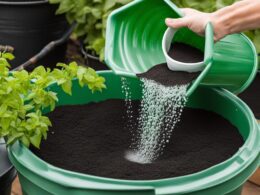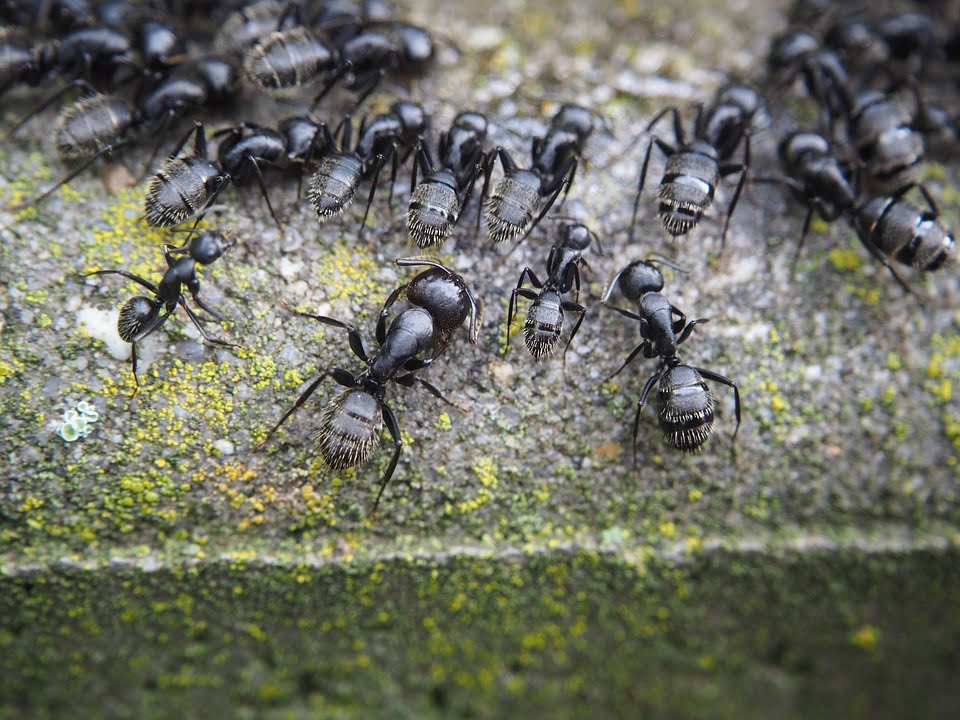Bugs that infest the soil in your garden can cause damage to plants and hinder their growth. Common pests include aphids, fungus gnats, spider mites, and whiteflies. These pests can chew through leaves, roots, and steal nutrients from the soil. It is important to regularly check your houseplants for infestations, especially during colder months when conditions are favorable for pests to thrive indoors. Natural methods, such as using a hydrogen peroxide solution and diatomaceous earth, can help eliminate these pests. Additionally, allowing the soil to dry out and using organic pesticides like neem oil can prevent infestations from getting out of hand.
Post Summary:
- Bugs in your garden soil can damage plants and hinder growth.
- Common pests include aphids, fungus gnats, spider mites, and whiteflies.
- Regularly check houseplants for infestations, especially during colder months.
- Use natural methods like hydrogen peroxide and diatomaceous earth to eliminate pests.
- Allowing soil to dry out and using organic pesticides can prevent infestations.
Identifying Common Houseplant Pests and Their Signs
Houseplants are a popular way to add greenery and beauty to your home, but they can also attract unwanted guests in the form of pests. It’s important to be able to identify common houseplant pests and recognize the signs of their presence, so you can take timely action to prevent infestations from spreading.
One of the most common houseplant pests is the spider mite. These tiny creatures leave behind fine webs along the bases of leaves and at stem junctures. If you notice these delicate webs, along with yellowing or speckling of the leaves, it’s likely that spider mites have taken up residence on your plants.
Another common pest is the mealybug, which can be visible to the naked eye. Mealybugs leave behind a sticky sap on plants and can often be found hiding in the nooks and crannies of leaves and stems. If you spot a sticky residue on your plants, it’s a strong indicator of mealybug infestation.
Scales are another pest that can wreak havoc on houseplants. They appear as dried, brown scales attached to leaves and are usually found in clusters. If you see these tiny brown bumps on your plants, it’s a clear sign of scale infestation.
Other common houseplant pests include fungus gnats, aphids, and scales. Fungus gnats resemble fruit flies and hover around the base of houseplants, while aphids are small, soft-bodied insects that suck sap from leaves and stems. It’s important to be vigilant and regularly inspect your houseplants for any signs of pest infestation, so you can address the issue before it becomes a major problem.
Common Houseplant Pests and Signs of Infestation
| Pest | Signs of Infestation |
|---|---|
| Spider Mites | Fine webs, yellowing or speckling of leaves |
| Mealybugs | Sticky sap, visible insects |
| Scales | Dried, brown scales attached to leaves |
| Fungus Gnats | Fruit fly-like insects hovering at plant base |
| Aphids | Small, soft-bodied insects on leaves and stems |
Natural Remedies for Getting Rid of Bugs in Houseplant Soil
If you’ve noticed bugs in your houseplant soil, don’t worry – there are natural remedies that can help you eliminate these pesky pests. By using these methods, you can protect your plants and create a healthier environment for them to thrive.
Hydrogen Peroxide Solution
One effective natural remedy is a hydrogen peroxide solution. You can create this solution by combining three parts water with one part 3% hydrogen peroxide. This solution not only kills bugs and their larvae but also promotes healthy root growth. Simply pour the solution into the soil, making sure to saturate it thoroughly. This will help eliminate bugs and prevent future infestations.
Diatomaceous Earth
Diatomaceous earth is another powerful remedy for bugs in houseplant soil. It is a fine powder made from fossilized remains of diatoms, a type of algae. The powder lacerates the shells of bugs and dehydrates them, effectively killing them off. Sprinkle a thin layer of diatomaceous earth on top of the soil and gently work it in with your fingers or a small garden tool. This will help eliminate bugs and prevent them from reinfesting the soil.
Soil Drying Out
Bugs thrive in moist soil, so allowing the soil to dry out thoroughly can help eliminate their presence. Avoid overwatering your houseplants and let the soil dry between waterings. This will create an environment that is less hospitable for bugs and their eggs. Remember to observe your plants carefully and adjust your watering routine accordingly.
Organic Pesticides
Another option for getting rid of bugs in houseplant soil is using organic pesticides like neem oil. Neem oil is derived from the seeds of the neem tree and has insecticidal properties. It is safe for plants and the environment, making it a great alternative to chemical pesticides. Dilute neem oil according to the package instructions and apply it to the soil. This will help prevent and treat infestations, keeping your houseplants healthy and bug-free.
| Remedy | Effectiveness | Benefits |
|---|---|---|
| Hydrogen Peroxide Solution | High | Kills bugs and promotes root growth |
| Diatomaceous Earth | High | Lacerates and dehydrates bugs |
| Soil Drying Out | Medium | Creates an unfavorable environment for bugs |
| Organic Pesticides (Neem Oil) | High | Safe for plants and the environment |
By utilizing these natural remedies, you can effectively get rid of bugs in your houseplant soil without resorting to harmful chemicals. Remember to be consistent with your treatments and monitor your plants regularly to prevent future infestations. With a little bit of care and attention, you can create a bug-free environment for your beloved houseplants.
Preventing Bugs in Your Garden Soil
Garden soil maintenance plays a crucial role in preventing bug infestations and ensuring the health of your plants. By following a few simple practices, you can create an environment that discourages bugs from taking up residence in your soil.
Limiting Soil Disturbance
One effective strategy is to limit soil disturbance in your garden. Excessive tilling and digging can disrupt the natural balance of the soil, making it more susceptible to pest infestations. Instead, opt for minimal cultivation and avoid unnecessary disturbance, allowing the soil ecosystem to thrive and maintain its natural defenses against bugs.
Using Compost
Using compost is another beneficial method for preventing bugs in your garden soil. Compost enriches the soil with essential nutrients and improves its structure, making it less attractive to pests. Additionally, the microbial activity in compost helps create a healthy environment that is inhospitable to bugs.
Using Mulch
Applying mulch on the soil surface is a practical way to prevent bugs and maintain a healthy garden. Mulch acts as a protective barrier, reducing moisture loss and temperature fluctuations in the soil. This creates unfavorable conditions for bugs to thrive. Choose organic mulch, such as wood chips or straw, as they can also promote beneficial soil organisms that naturally control pests.
Rotating Crops
Rotating your crops can help break the life cycle of pests that target specific plants. Different pests are attracted to different plants, and by rotating crops, you can disrupt their feeding and breeding patterns. This practice can reduce the likelihood of bug infestations and promote overall plant health.
Monitoring Your Garden
Regularly monitoring your garden is essential for early detection and prevention of bug infestations. Inspect your plants for any signs of pests or damage, such as chewed leaves, wilting, or discoloration. Remove any fallen leaves, blooms, or weeds promptly, as they can provide hiding places and breeding grounds for bugs. By staying vigilant, you can address any issues before they become widespread.
Kitchen Remedies
In addition to the above practices, using kitchen remedies can further enhance bug prevention in your garden. Certain plants, like garlic, hot peppers, and ginger, have natural repellent properties that bugs dislike. Planting these alongside your other crops can help deter pests and keep your garden bug-free.
| Garden Soil Maintenance Tips |
|---|
| Limit soil disturbance |
| Use compost |
| Apply mulch |
| Rotate crops |
| Monitor your garden |
| Utilize kitchen remedies |
Conclusion
Bugs in your garden soil can be a common problem for gardeners, but there are natural and effective ways to control and prevent them. By maintaining healthy soil through practices like limiting disturbance, using compost, and applying mulch, you can create an environment that discourages bug infestations.
Regular monitoring of your garden and using kitchen remedies for bug control can also be helpful. Remember to water your plants regularly, keep the garden clean, and consider organic pesticides like neem oil when needed. By implementing these bug control tips, you can ensure the health and vitality of your garden.
So, don’t let bugs ruin your garden. Embrace these bug prevention tips and maintain a healthy soil that will not only deter pests but also promote the growth of your beautiful plants. Keep your garden thriving and enjoy the fruits of your labor!
FAQ
What are some common houseplant pests and how can I identify them?
Common houseplant pests include spider mites, mealybugs, fungus gnats, aphids, and scales. Spider mites weave fine webs, mealybugs leave behind a sticky sap, scales look like dried scales attached to leaves, fungus gnats resemble fruit flies, and aphids are small, soft-bodied insects that suck sap.
What are some natural remedies for getting rid of bugs in houseplant soil?
Two effective natural remedies are using a hydrogen peroxide solution (3 parts water, 1 part hydrogen peroxide) and applying diatomaceous earth. Allowing the soil to dry out and using organic pesticides like neem oil can also help eliminate pests.
How can I prevent bugs in my garden soil?
You can prevent bugs in your garden soil by limiting soil disturbance, using compost, applying mulch, rotating crops, regularly monitoring your garden, and removing fallen leaves, blooms, and weeds. Kitchen remedies like garlic, hot peppers, and ginger can also help repel bugs.
How do I maintain healthy soil to prevent bug infestations?
Maintaining healthy soil involves practices like limiting disturbance, using compost, applying mulch, and rotating crops. Regular monitoring and cleanliness, as well as using organic pesticides when needed, are also important for bug control in the garden.





